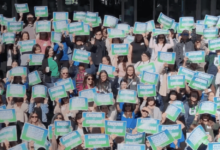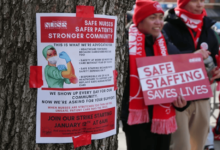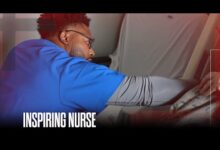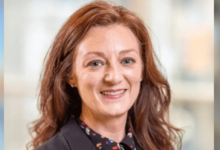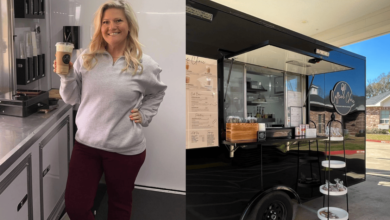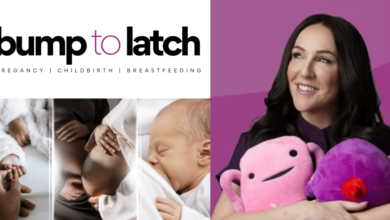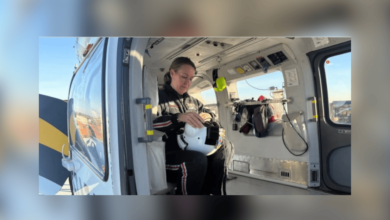Nursing associate campaigning for neurodiversity training

A nursing associate is trying to make the NHS more “neurodivergent friendly” after poor experiences while he was training almost made him quit.
Antony Harding was diagnosed with autism, dyslexia and dyspraxia at the age of 40, shortly after qualifying as a nursing associate in 2022, thanks to the intervention of a nurse manager.
“The message is so simple: support your neurodivergent staff, protect us”
Antony Harding
He has now made a short film about his story and is campaigning for new training for NHS staff and leaders on recognising potential signs of neurodivergence in colleagues and students.
During his nursing associate training, Mr Harding was struggling due to his undiagnosed neurodivergence but instead of receiving support, he felt he was bullied and victimised.
“I think certain individuals, bear in mind that these are all qualified and experienced nurses in high-end positions, personally did their absolute utmost to make things as difficult for me as possible,” he told Nursing Times.,
“Whether that was to make me fail or to get me to the point of quitting, which they nearly did on about three or four occasions.”
After qualifying, Mr Harding left the trust where he trained and took up a role at Sheffield Teaching Hospitals NHS Foundation Trust, where he is still working now.
It was at this trust that a nurse manager noticed that he was having difficulties and referred him for a workplace assessment, which resulted in him being diagnosed with dyslexia and dyspraxia.
For many years, Mr Harding had suspected that he may have a neurodivergent condition and had requested an assessment via his GP but was misdiagnosed with depression instead.
However, his dyslexia and dyspraxia diagnosis empowered him to go back to his GP and gain an autism assessment.
In November 2022, Mr Harding was diagnosed with autism too.
The diagnosis hit Mr Harding like a “monster truck” and caused him to have a breakdown at work as he reflected on everything that had led him to that moment and the years of being misunderstood.
After six weeks off, Mr Harding returned and he then saw the occupational health team, which made some recommendations for reasonable adjustments and signposted him to further support including mentorship and counselling with an autism psychologist.
Having previously moved around various departments, Mr Harding was eventually found a role working in outpatients, which suited his needs.
“There’s a bit more structure, a bit more routine. I’ve been able to learn lots of different skills, things I wanted to learn as a student,” he said.
“I’ve got a really good skillset built up, so things like doing venipuncture bloods, wound care, dressings, removal of plaster casts, inhaler techniques, injection techniques and promoting positive health and good health for patients.
“How many nurses have we lost because of that?”
Antony Harding
“It’s got my confidence back up, and everybody’s been really supportive.
“There’s been good times and there’s been bad times, but I’m in a better position than where I was two, three, four years ago when I was student.”
In May 2023, Mr Harding wrote about his experiences for Nursing Times.
This then led to him being approached earlier this year by his trust to create a video of his story to show at an autism awareness webinar.

Oliver Ibbotson
He connected with old school friend Oliver Ibbotson, who is a filmmaker and also received a later-life diagnosis of autism and attention deficit hyperactivity disorder (ADHD), who agreed to help him create the video.
The pair turned the project into a short documentary, Unmasking Man, which was played at the autism awareness webinar at the trust last month and has also been shared more widely on YouTube.
Mr Harding said the response to the documentary had been “absolutely unreal”.
He added: “When you think about it, the message is so simple: support your neurodivergent staff, protect us. Don’t see us as trouble or a nuisance.”
Without the interventions made and support provided by his current trust, Mr Harding said he may not have received a diagnosis and probably would no longer be nursing.
He now wants to spread awareness among more staff and managers in the NHS, in continued collaboration with Mr Ibbotson, who he credits for the success of his documentary.
“We’ve just had the Oliver McGowan training to support patients with autism and learning disabilities. It would be nice to have something for the staff to support neurodivergence within nursing,” said Mr Harding.
As a start, he wants to see neurodiversity included in training for practice supervisors, who support and supervise nursing and midwifery students during workplace placements.
“Just to add a couple of slides in that [training to highlight] that potentially a student is struggling because they may be autistic or ADHD or have some sort of neurodiverse condition or hidden disability,” said Mr Harding.
“And just to kind of signpost the student or the staff member where they can get support, whether that’s in-house with the trust, or whether that’s externally.”
He is also calling on employers in the NHS to utilise neurodiverse staff in a way that plays to their strengths, “rather than expecting us to fit into a neurotypical box”.
His hope is to change “attitudes and mindsets” and ultimately make the NHS a “neurodivergent friendly” place to work, which will in turn help with the recruitment and retention challenges that the health service faces.
He noted how, since his article in Nursing Times in May, he had been approached by others who connected with his experience, including some who had quit or failed their nursing degree and then later diagnosed with autism or another neurodivergence.
“How many nurses have we lost because of that?,” he questioned.
“If I can help one person, if I can stop things happening to one person what happened to me, then that’s job done,” he added.
